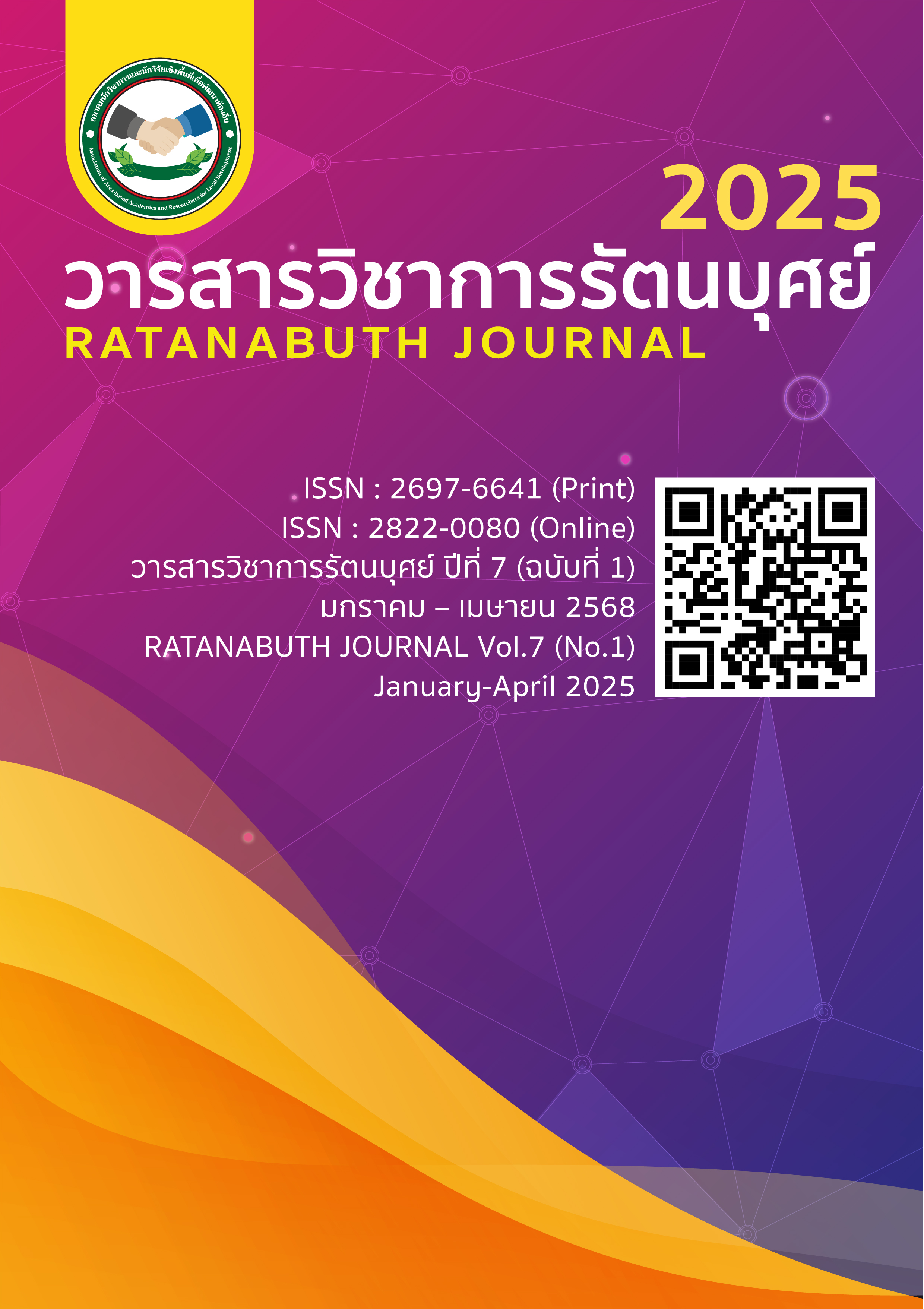Lessons Learned from Local Government in Thailand: The Case of the 2025 Chiang Mai Provincial Administration Organization Election Lessons Learned from Local Government in Thailand: The Case of the 2025 Chiang Mai Provincial Administration Organization Election
Main Article Content
Abstract
The article presents a study on “Lessons Learned from Local Governance in Thailand: A Case Study of the Chiang Mai Provincial Administrative Organization Election 2025”. Collects data from secondary sources, such as books, news websites, and online media. The election for the mayor of the Chiang Mai Provincial Administrative Organization and its members was held on Saturday, February 1, 2025. The focus is on analyzing the lessons learned for the Pheu Thai Party and the People’s Party, both of which were popular at the time. The authors analyze the situation based on the real context of the events that occurred and proposes for studying election situation reveals that it reflects the principles of democratic political systems, as it provided an opportunity for citizens to choose their leaders, thereby allowing the exercise of their rights under the principle of decentralization of power. And three main findings were discovered after the election results were known: 1) The issue of campaign strategies, 2) Lessons learned by political parties and the public, and 3) The politics of powerful local families, among others.
The study found that, it was found that the first issue, the campaign strategies of the two political parties, differed in terms of their familiarity with the public. As a new political party, this made their popularity ratings differ, yet both still enjoyed widespread support from the public. Issue is the lesson from the public, reflecting that elections in provinces should allow citizens to vote at any location, especially for those living away from their hometowns who cannot travel back. As for the political parties, the lesson from political parties reflects the competition in creating achievements that are recognized by the public, through the presentation of policies that cater to all segments of society, whether from established or newer political parties, in order to maintain popularity across all eras. The final issue that warrants attention is the role of local politics, which plays a significant influence in determining election results and the decision-making process in selecting leaders. Politics in the form of local political dynasties or bloodline politics plays a role in supporting political candidates' campaigns. Local politics directly impacts the lives of citizens and serves as an essential starting point for the expression of fundamental civil rights, enabling citizens to choose leaders capable of strengthening and developing local communities sustainably.
Article Details

This work is licensed under a Creative Commons Attribution-NonCommercial-NoDerivatives 4.0 International License.
References
โกวิทย์ พวงงาม.(2562). การปกครองท้องถิ่นไทย: หลักการและมิติใหม่ในอนาคต. กรุงเทพฯ: วิญญูชน.
กอเดช สมันดาโอะ. (2565). พัฒนาการการกระจายอำนาจและการปกครองท้องถิ่นไทย. วารสาร มจร เลย ปริทัศน์, 3(1), 141–150.
ชัยรัตน์ วงศ์กิจรุ่งเรือง. (2558). การเปลี่ยนแปลงการปกครองท้องถิ่นของประเทศไทย. วารสารสังคมศาสตร์และมนุษยศาสตร์, 41(1), 17-34.
ชุมพล นามสังข์. (2561). การปกครองท้องถิ่นภายใต้บทบัญญัติรัฐธรรมนูญแห่งราชอาณาจักรไทย ฉบับ พ.ศ. 2560: แนวโน้มและความคาดหวัง. กรุงเทพฯ: มหาวิทยาลัยธรรมศาสตร์.
ดาวนภา เกตุทอง. (2563). การกระจายอำนาจสู่องค์กรปกครองท้องถิ่น. วารสาร มจร เพชรบุรีปริทรรศน์, 3(2), 46–57.
ธเนศวร์ เจริญเมือง. (2562). ท้องถิ่นไทย: ท้องถิ่น, การบริหารจัดการท้องถิ่น, และสังคมไทย (พ.ศ.2435 - 2561) บทเรียนและก้าวต่อไป. เชียงใหม่: มูลนิธิสถาบันพัฒนาเมืองเชียงใหม่.
วีร์ชาพิภัทร ผาสุก. (2566). การปกครองท้องถิ่นและการกระจายอำนาจขององค์กรปกครองส่วนท้องถิ่นประเทศไทย. วารสาร มจร.เลย ปริทัศน์, 4(1), 94-102.
วีรศักดิ์ เครือเทพ. (2567). บทวิจารณ์หนังสือ “การกระจายอำนาจสู่ท้องถิ่น” และ “ผู้ว่าฯ เลือกตั้งโดยประชาชน”. วารสารสังคมศาสตร์ มหาวิทยาลัยนเรศวร, 20(2), 365-376.
ศิริวดี วิวิธคุณากร, ภักดี โพธิ์สิงห์, & สัญญา เคณาภูมิ. (2565). การปกครองท้องถิ่นไทยในยุคพลิกผันการเปลี่ยนแปลง. วารสารการบริหารการปกครองและนวัตกรรมท้องถิ่น, 4(2), 357–374.
สุทธินันท์ สุวรรณวิจิตร, & บุญเรือง เตชะวิวัฒน์กุล. (2564). การกระจายอำนาจการปกครอง. วารสารมหาจุฬานาครทรรศน์, 8(5), 123-134.
สถาบันพระปกเกล้า. (2547). สารานุกรมการปกครองท้องถิ่นไทย. กรุงเทพฯ: สถาบันพระปกเกล้า.
อภิญญา ฉัตรช่อฟ้า, พระปลัดสมนึก ธีรปญฺโญฃ, & บวร ขมชุณศรี. (2565). การปกครองท้องถิ่นไทยในยุครวมศูนย์อำนาจ. วารสาร มจร สังคมศาสตร์ปริทรรศน์, 11(3), 422-435.
Chiang Mai News. (2568). กว่า 20 ปี - ย้อนรอยผลการเลือกตั้งอบจ.เชียงใหม่. สืบค้นเมื่อ 29 มีนาคม 2568, จาก https://www.youtube.com/watch?v=hkDYcOFIA0c.
Thai PBS Online. (2568). นักวิชาการระบุผล นายก อบจ.เชียงใหม่ เป็นไปตามคาดแต่แปลกใจช่วงคะแนนที่สูสี.สืบค้นเมื่อ 24 กุมภาพันธ์ 2568, จาก https://www.thaipbs.or.th/news/content/348876.
Thai PBS Online. (2568, 2 กุมภาพันธ์). “พรรคประชาชน” พ่าย นายก อบจ.เชียงใหม่ แต่ได้ ส.อบจ.15 จาก 42. สืบค้นเมื่อ 25 กุมภาพันธ์ 2568, จาก https://www.thaipbs.or.th/news/content/348875.
Political Science, CMU. (2568, 5 มีนาคม). เราเรียนรู้อะไรจากเลือกตั้ง อบจ. 68?. สืบค้นเมื่อ 7 มีนาคม 2568, จาก https://web.facebook.com/polscicmu/videos/649324937750564/.


